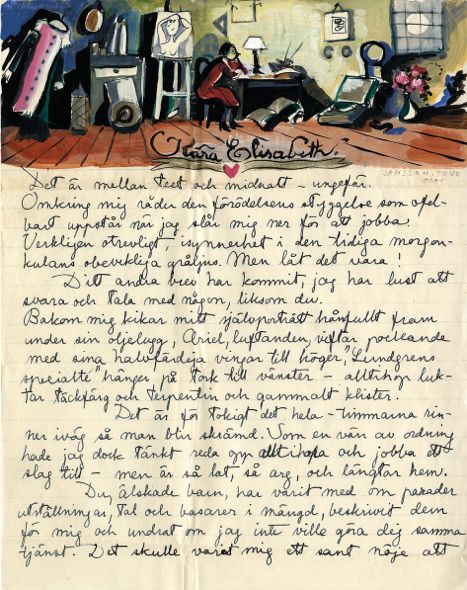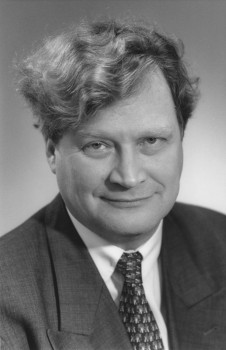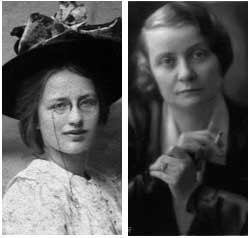Search results for "2010/02/let-us-eat-cake"
Troubled waters
31 March 2005 | Archives online, Fiction, Prose
Extracts from the novel Den amerikanska flickan (‘The American girl’, Söderströms, 2004). Introduction by Pia Ingström
Doris Night&Sandra Day, Sandra Night&Doris Day: those were their alter ego identities for the game, which also involved the smiles they’d practised in front of the mirror at the bottom of the empty swimming pool, in the house in the muddier part of the woods.
‘We’re two clairvoyant sisters,’ said Doris Flinkenberg. ‘We got that way because of tragic circumstances. The poltergeist phenomenon. Do you know what that is?’
Sandra Wärn shook her head, but looked expectantly at Doris, the perennial crossword – solver, with dictionary to hand, who continued. ‘It’s when the innocent child has been badly abused and has developed supernatural powers in order to survive. Powers to see behind what’s there,’ Doris Flinkenberg explained. ‘To see what no one else can see.’
‘You and I, Sandra,’ Doris confirmed. ‘We were badly abused. I with my scars and you with your tragic family background, your mother and her lover, all of that. You and I, Sandra, we know what it is to suffer.’ More…
Word for word
30 September 1992 | Archives online, Fiction, poetry
Poems from Falla (Eurydike) [‘Falling (Eurydice)’, Söderström & Co., 1991]. Introduction by Michel Ekman
a murderer who is running through the culverts of a hypermodern
high-rise complex asks desperately about possible ways out if he meets anyone,
he does not express himself symbolically,
in a locked room he writes poems no one understands, what he
writes is real –
you came to me at night you asked me to do something, I did it, for I am possessed, by you (fixed image!) in me, by myself by your constant flight out of me, incomplete by my flight –
now you are changed: I love your fleetingness
your flight is in vain –
what’s done is done More…
Re-inventing the book: on the papernet, pod and the unbook
20 May 2009 | Articles, Non-fiction

Mind-map: using the papernet to produce books just for you. - Photo: Brian Suda
Just as Books from Finland finally goes online, the brightest minds of the internet are forecasting a return to paper. In the first of a series of articles, the poet and scholar Teemu Manninen celebrates the second coming of the book
Last week I did something I’ve never done before. I uploaded the manuscript of my third book on to the website Books on Demand, an internet print-on-demand (‘pod’) service, chose the format (a large 19×22 cm size with a hard cover), selected a picture for my cover, copy-pasted a poem by Clark Ashton Smith – an American science fiction and fantasy writer – on the back flap and ordered a copy. More…
Upstairs, downstairs
31 March 2000 | Archives online, Fiction, Prose
From Harmia lämpöpatterista (‘Trouble with the radiator’, Gummerus, 1999). Introduction by Tero Liukkonen
The view
From here, I can see straight into their bedroom. The thin man chases the red-haired mountain of lard; round and round the room they go: the man is swinging something in his hand, I can’t see what, while the lard-mountain squeals until the man throws her onto the bed. The same thing happens every night; I can’t see the bed. Too low, and I wouldn’t want to, besides; lewd ugly makes me sick that I can even think of it.
Downstairs a young man is always watching TV, sitting there motionless all evening. The blue flickers, never turns on the light, a young man. He has long, slender legs and arms, but his face I can’t see, it’s too dark. There are painting tools on his window sill. More…
Poems
30 June 1985 | Archives online, Fiction, poetry
Introduction by Bo Carpelan
A flower beckons there, a secent beckons there, enticing my eye. A hope glimmers there. I will climb to the rock of the sky, I will sink in the wave: a wave-trough. I am singing tone, and the day smiles in riddles.
*
Like a sluice of the hurtling rivers I race in the sun: to capture my heart; to seize hold of that light in an inkling: sun, iridescence. In day and intoxication I wander. I am in that strength: the white, the white that smiles.
*
To my air you have come: a trembling, a vision! I know neither you nor your name. All is what it was. But you draw near: a daybreak, a soaring circle, your name.
The mighty word
15 November 2012 | Fiction, Prose
‘Mahtisana’, a short story from the collection Lapsia (‘Children’, 1895). Introduction by Mervi Kantokorpi
Mother and Dad hadn’t said a single word to each other since lunchtime. The children, Maija and Iikka, were quiet, too. They sat apart, Iikka on the chair at the end of the sofa, where he could see the moon through the window, and Maija next to the window looking out on the street, where children moved about on skis and sleds. They didn’t dare make a sound, not even a whisper to ask for permission to go outside. It had been so quiet all that Sunday evening that when Mother spoke, encouraging them to go out and play, both of them nearly jumped.
They left without saying a word, Maija creeping quite silently. Even out in the courtyard she and Iikka still spoke in whispers as they decided which hill to go to. They didn’t really want to go anywhere, but when they came out to the street and could hear the happy shouts of children from every direction, it refreshed their spirits. Maija sat Iikka down on the sled and set off at a run, pulling him behind her. She felt as if her gloomy mood was falling away in pieces to be trampled underfoot.
A few streets down there was a large crowd of boys on the corner. They decided to go and see what was happening. More…
Writing letters
30 December 2001 | Fiction, Prose
From Meddelande. Noveller i urval 1971–1997 (‘Messages. Selected short stories 1971–1997’, Schildts, 1997)
I’ll make it to Maritim, got hold of Gustafsson, van coming at 8, have redirected mail to summer address, bye kiss Tooti
Take last things out of fridge
Hi my name is Olavi. You write well but last time you didn’t make a happy ending. Why do you do this?
We look forward to your valued reply soonest concerning Moomin motifs on toilet paper in pastel shades
Don’t say too much if they ring, don’t promise yet. Bye Tooti
Hi! We’re three girls in a mad rush with our essays about you could you help us by saying in just a few words how you started writing and why and what life means to you and then a message to young people you know the kind of thing. Thanks in advance More…
The situation in Narva
31 December 1993 | Archives online, Fiction, Prose
A short story from Pakosarja (‘Exhaust manifold’, WSOY, 1993)
We went into the building where Voroshilov said the waitress had disappeared. Inside was a big room lined with wooden benches. A tin-clad stove radiated heat. Someone had shut the dampers too early, probably out of meanness; it had that kind of smoky smell.
A corridor led from the room, with a few doors off it. We peered inside, but there was no one to be seen. There was nobody in the entire building. We left.
We walked across the railway yard in what I thought was the direction of the train. We heard the sound of the engine long before we could see anything through the snowstorm. At regular intervals the engine’s pressure valve let off steam. Voroshilov went for a leak. He leaned against the engine’s big back wheel and watered the lever, which had been left in the down position. The liquid ran down the engine’s rounded flank. The snowflakes melted as they fell on to the black casing of the water-tank. More…
What’s so great about paper?
17 September 2009 | Articles, Non-fiction

High-tech: the ultimate gadgets of the 15th century, parchment and pen. A portrait of Jean Miélot, the Burgundian author and scribe, by Jan Tavernier (ca. 1456)
The day will soon come when commuters sit on a bus or train with their noses buried in electronic reading devices instead of books or newspapers. Teemu Manninen takes a look at the digital future
Most people interested in books are aware of the arrival of electronic reading devices such as the Amazon Kindle, a kind of iPod — the immensely popular portable music listening device made by the company Apple — for electronic books. For a literary geek like me, the Kindle and e-readers should be the ultimate gadget: a whole library in a small, paperback-sized device. However, I’ve been wondering why digital reading hasn’t become as popular as digital listening. I myself have not invested in an e-reader, although I ought to be exactly the desired kind of customer. After all, I read all the time. Even the mp3 player I have is mostly used for listening to audio books. More…
Letters from Tove
6 October 2014 | Extracts, Non-fiction

Early days: Tove Jansson went to Stockholm to study art when she was just 16. A letter to her friend Elisabeth Wolff, from November 1932
Artist and author Tove Jansson (1914–2001) is known abroad for her Moomin books for children and fiction for adults. A large selection of her letters – to family, friends and lovers – was published for the first time in September. In these extracts she writes to her best friend Eva Konikoff who moved to the US in 1941, to her lover, Atos Wirtanen, journalist and politician, and to her life companion of 45 years, artist Tuulikki Pietilä.
Brev från Tove Jansson (selected and commented by Boel Westin and Helen Svensson; Schildts & Söderströms, 2014; illustrations from the book) introduced by Pia Ingström
7.10.44. H:fors. [Helsinki]
exp. Tove Jansson. Ulrikaborgg. A Tornet. Helsingfors. Finland. Written in swedish.
to: Miss Eva Konikoff. Mr. Saletan. 70 Fifty Aveny. New York City. U.S.A.
Dearest Eva!
Now I can’t help writing to you again – the war [Finnish Continuation War, from 1941 to 19 September 1944] is over, and perhaps gradually it will be possible to send letters to America. Next year, maybe. But this letter will have to wait until then – even so, it will show that I was thinking of you. Curiously enough, Konikova, all these years you have been more alive for me than any of my other friends. I have talked to you, often. And your smiling Polyfoto has cheered me up and comforted me and has also taken part in the fortunate and wonderful things that have happened. I remembered your warmth, your vitality and your friendship and felt happy! At first I wrote frequently, every week – but after about a year most of it was returned to me. I wrote more after that, but the letters were often so gloomy that I didn’t feel like saving them. Now there are so absurdly many things I have to talk to you about that I don’t know where to begin. Koni, if only I’d had you here in my grand new studio and could have hugged you. After these recent years there is no human being I have longed for more than you. More…
A dictionary of human destinies
31 March 2001 | Fiction, Prose
Short stories from Av blygsel blev Adele fet (‘It was embarrasment that made Adele fat’, Söderström & Co., 2000)
Adele
It was embarrassment that made Adele fat. It wasn’t from hunger that her fridge-fumbling fingers began to grow nimble, but from confusion. And it was never knowing what her tongue ought to say that led her to the concrete business of the fridge. Her tongue certainly knew all about tasting. It could feel her teeth chewing even if it didn’t know how to speak. It became a better and better judge of brussels sprouts and speckled sausage. The rest was just good morning and thanks, thanks and goodbye and nice day. More…
Troubled by joy?
30 September 1998 | Fiction, poetry
Poems from Boxtrot (WSOY, 1998)
Nine lives
So far nine lives only, and
all mine, like my head in my hands.
My first was curled up at the foot of a fir tree
in the autumn forest just at day-dawn
in nighttime's raindrops.
The resin's still in my fingernails.
My second was the scent of split wood by the shed,
and the circular-saw blade's horrific disc.
The gruel, track shoes too large, and President Kekkonen,
ink spreading across my notebook, and
the clank of the railway under my dreams.
Mayday's red flags, the neighbour's daughter
naked, and dead pigeons lying on the gravel.
My third life was the discovery of anger, blind rage
turning and turning me in its leather bag,
wearing the edges of my day down. Sitting at our schooldesks
being forced towards a goal that can't be named.
Seeing how they start drinking, drinking
into their eyes that black impotent rebellion.
I'm on the point of drowning, someone's traversing
the Atlantic in a reed boat. And if I did die,
it wouldn't matter who sneered. The stars in the sky
are watching us in horror.
New from the archives
19 February 2015 | This 'n' that

Jarkko Laine. Photo: Kai Nordberg
Our archive find this week is ‘The 101 year anniversary celebration’, a short story by Jarkko Laine.
‘Child of Marx and Coca-Cola’, ‘Nordic beatnik’, Jarkko Laine (1947-2006) published his first work, a volume of poetry entitled Muovinen Buddha (‘Plastic Buddha’) in the 1960s and was immediately hailed as the mouthpiece of his generation. He went on to make his career as a literary all-rounder – poet, writer, playwright, translator, long-time editor of the literary magazine Parnasso and chair of the Finnish Writers’ Union. His wryly ironic story, ‘The 101 year anniversary celebration’ tells the story of what every writer must dread: a guest appearance in a local library where literature from the local town, let alone further afield, is regarded with suspicion.
We’ve also unearthed a 1989 interview, by our late, genial editor-in-chief Erkka Lehtola with a grey-suited Laine who looks more like a civil servant than a 1960s radical – but still doesn’t let a day go by without writing.
*
The digitisation of Books from Finland continues apace, with a total of 360 articles and book extracts made available online so far. Each week, we bring a newly digitised text to your attention.
Poems, poèmes
30 June 1987 | Archives online, Fiction, poetry
Poems from Mies joka rakasti vaimoaan liikaa (‘The man who loved his wife too much’, 1979 and Vaikka on kesä (‘Although it’s summer’, 1983). Interview by Markku Huotari
Look at this epitaph with whiskers.
Threw herself so gladly into my troubles, sometimes she seemed to be bearing, properly, my burdens.
A dog called Julia. Combining
July and Yuletide.
Often thought of putting her down, so she wouldn’t need to die.
Smash her skull or break her neck
with my own hands, to stop her mourning her premature death.
Which still seems to be delaying.
She puts her four paws gently down, one at a time. So the Lord won’t hear her still about
and whisk her away.
Two years ago, she steps on some glass, her toe sticks out, a tendon’s cut.
She looks at me. Believe it or not,
I’m grieved by little Julia’s lot: for a second
I think the blood’s dripping from my own heart. More…

